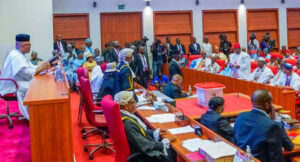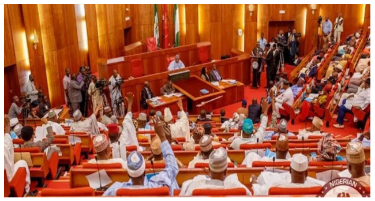The Nigerian Senate has rejected a bill seeking to repeal the Foreign Exchange (Monitoring and Miscellaneous Provision) Act of 2004 and establish a new framework for the Foreign Exchange Market in Nigeria. This bill, initially introduced in February 2024 by Senator Mohammed Sani representing Niger East, aimed to provide enhanced control, monitoring, and supervision of transactions within the foreign exchange market.
In his lead debate, Senator Sani clarified that the bill was not intended to create any new agency or commission that would necessitate additional government funding. Instead, it sought to streamline existing processes and ensure better oversight of foreign exchange transactions, with the ultimate goal of contributing to the sound development of Nigeria’s economy. The bill was also intended to facilitate smoother foreign transactions and stabilize the value of the naira by promoting the liberalization of foreign exchange dealings.
One of the key provisions of the bill was found in Clause 6, which introduced new sub-clauses (2), (4), and (5). These sub-clauses required authorized dealers to report to the Central Bank of Nigeria (CBN) on the sources of foreign exchange transactions exceeding 10,000 US dollars, detail the utilization of such funds, and seek prior approval from the CBN when importing foreign currency notes. These measures were designed to enhance transparency and accountability in the foreign exchange market.
 While some lawmakers supported the bill, arguing that it would bring about much-needed reform and stability to the foreign exchange market, others raised concerns about its potential implications. Some senators found certain provisions of the bill to be confusing and called for further scrutiny to ensure that it would not inadvertently create additional complexities or challenges.
While some lawmakers supported the bill, arguing that it would bring about much-needed reform and stability to the foreign exchange market, others raised concerns about its potential implications. Some senators found certain provisions of the bill to be confusing and called for further scrutiny to ensure that it would not inadvertently create additional complexities or challenges.
There was also apprehension among some senators regarding the immediate impact the bill’s passage might have on the foreign exchange market and the pressure it could exert on the naira. Given the delicate state of Nigeria’s economy and the existing pressures on its currency, these concerns were taken seriously during the deliberations.
Ultimately, when the bill was put to a voice vote, it was quashed. The rejection reflects the Senate’s cautious approach to major legislative changes that could have significant economic repercussions. The decision underscores the need for comprehensive and carefully considered policies to manage Nigeria’s foreign exchange market effectively.
The debate and subsequent rejection of this bill highlight the complexities and challenges involved in reforming the foreign exchange market in Nigeria. As the country continues to navigate economic uncertainties and seeks to stabilize its currency, legislative efforts will need to be meticulously crafted and thoroughly examined to ensure they contribute positively to the nation’s economic health.
The rejection of the bill also signals that any future attempts to reform the foreign exchange market will require extensive consultation with stakeholders, clear and unambiguous provisions, and a careful assessment of potential impacts on the economy. As Nigeria strives for economic stability and growth, the Senate’s decision reflects a commitment to prudent and measured policymaking in the face of complex financial challenges.




